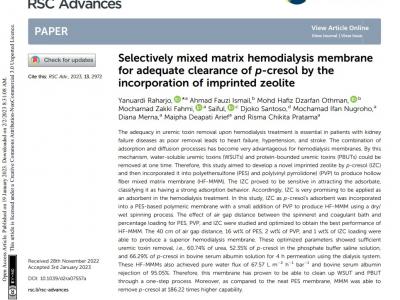Effect of Cayratia trifolia Ethanol Extract on Bcl-2 expression and Apoptotic Cells in Dmba-induced Breast Cancer of Sprague Dawley Rats
- Artikel Ilmiah
- /
- 29/06/2020
- /
- 0

Abstract
The study aimed to clarify the effect of the administration of ethanol extract of Cayratia trifolia plants to breast cancer. This study was an experimental study using female animal model of Sprague Dawley rats, consisting of three groups, K0, the normal experimental animals, K1, the experimental animals with breast cancer receiving CMC 0.5%, and KP, experimental animals with breast cancer receiving ethanol extract of Cayratia trifolia in a dose of 300 mg/kgBW at 0.5% CMC. The material to induce breast carcinoma formation was DMBA of 20 mg/kg in corn oil. The extraction of Cayratia trifolia plants used ethanol. The variables were the number of cells expressing Bcl-2 observed with immunohistochemical methods, and the number of cells undergoing apoptosis, which was observed using tunnel assay method. Statistical analysis was performed using ANOVA test. The number of cells expressing Bcl-2 and those undergoing apoptosis in breast cancer tissue between groups of animals receiving and not receiving ethanol extract of Cayratia trifolia showed significant difference (P<0.05). Oral administration of Cayratia trifolia ethanol extract has an effect on the decrease in the number of cells expressing Bcl2 and an increase in the number of cancer cells undergoing apoptosis.
Introduction
Cancer is a disease characterized by uncontrolled cell division. Based on the hospital information system, the highest incidence of cancer patients in Indonesia in women is breast cancer and cervical cancer, with a percentage of 28.7% and 12.8% respectively [1], where cervical cancer ranks second after breast cancer [1, 2]. Currently the methods used to treat breast cancer are surgery, administration of radiotherapy, and chemotherapy. However, these methods have not provided satisfactory results. They often give adverse side effects for the patients. Therefore, chemicals that can be used as anticancer and have low side effects need to be formulated. Some researchers report chemicals that can be used as anti-cancer, one of which is piceid. Piceid is reported to be a chemical that acts to inhibit DNA synthesis [3]. Other chemicals are kaempferol, a chemical used as an anti-angiogenesis in ovarian cancer [4], and resveratrol, which in vitro can inhibit various tumor cell lines, but does not inhibit normal cells [5]. One of plant containing piceid, kaempferol, and resveratrol, is a Cayratia trifolia, which has an integration of (1) stilbenes (piceid, resveratrol, viniferin, and ampelopsin), (2) kaempferol, and (3) quercetin [6].
However, the effect of providing Cayratia trifolia plant extract to breast cancer is unclear. Therefore, this study aims to reveal the effect of extracts of Cayratia trifolia plants on cancer cells. Disrupted control of cell division cycles in cancer cells is due to the presence of multiple gene defects, the proto-oncogenes, such as Bcl-2 and tumor suppressor genes, including the p53 [7]. Disability of the two groups of genes results in uncontrolled cell division, leading to abnormal cell accumulation.
Source: http://www.jgpt.co.in/index.php/jgpt/article/view/2971/2383
Keywords:




